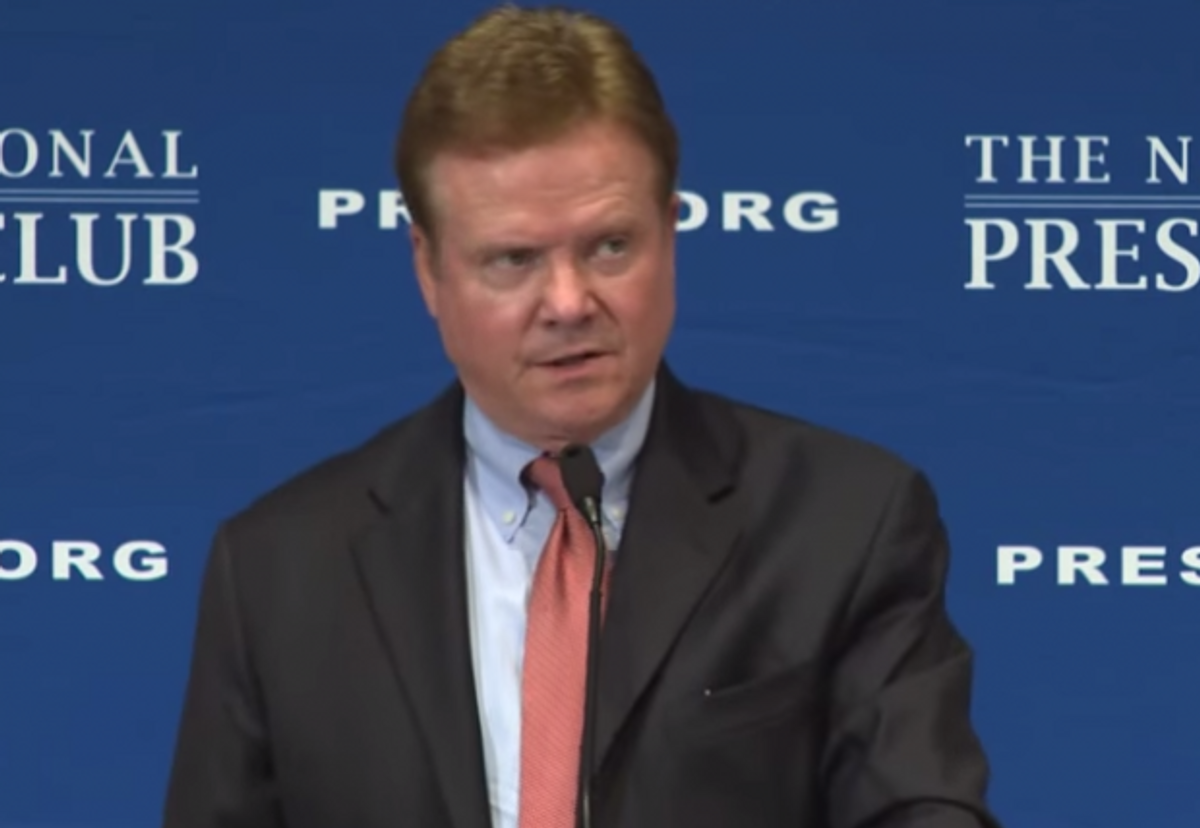Speaking before an audience in Richmond on Tuesday, former Virginia senator and likely Democratic presidential candidate Jim Webb took his party to task for becoming "a party of interest groups."
Gearing up for a campaign in which he'll seek to woo white, working-class voters back into the Democratic fold, Webb charged that for too long, Democrats have emphasized identity politics at the expense of bread-and-butter concerns.
“The Democratic Party has lost the message that made it such a great party for so many years, and that message was: Take care of working people, take care of the people who have no voice in the corridors of power, no matter their race, ethnicity or any other reason,” he said. “The Democratic Party has basically turned into a party of interest groups.”
For a country hungry for a leader who will channel its anxieties about economic inequality and the distribution of power into constructive action, Webb's appeal to those "who have no voice in the corridors of power" is, on the surface, quite attractive. And there's no doubt that the forces of inequality hit people across identity groups.
But Webb is dead wrong when he excoriates the party for its focus on "interest groups." For starters, it's quite repugnant to suggest that people fighting for equal treatment -- racial minorities, immigrants, the LGBT community, women -- are just additional "interest groups," akin to the oil and gas lobby or the Business Roundtable.
Moreover, Webb's remarks conveniently glide over the fact that factors like race, gender and sexual orientation are deeply implicated in the systemic inequities his nascent White House campaign purportedly aims to address.
Here's what Webb misses.
It may be comforting to pretend that we can tackle income inequality with a purely colorblind approach, with a rising tide lifting white working-class and low-income minority boats alike. But while no group is untouched by inequality, not all groups experience the problem equally. In 2010, the median net worth for white households was $110,729. By contrast, Hispanics' median net worth was $7,424, while African-Americans' stood at a mere $4,955. What's more, research shows that poor whites are better off than racial and ethnic minorities. A Johns Hopkins University study unveiled earlier this year found that compared with whites who earn roughly the same income, African-Americans' lives are far more unstable. Here's the Root, summarizing the findings:
Black neighborhoods in Baltimore were more likely to be upended by public works projects; highway construction or new railroad lines cut a swath through once-stable communities, sending families scattering. Ninety percent of families that had to relocate because of public works projects were African American, according to Alexander. Working-class white kids were more likely to stay in the same neighborhood, fostering stability and extended social networks.
With deindustrialization, high-paying working-class jobs all but evaporated. But of those blue-collar jobs that remained, white men were much more likely to find work, according to Alexander. At age 28, the last year the former schoolkids were surveyed, 45 percent of the white men were working in those jobs, compared with 15 percent of black men. Among the students who dropped out, only 40 percent of black dropouts were working, compared with 89 percent of white dropouts. Low-income white men in the study had the lowest rate of college attendance or completion, but they also earned double what black men earned.
What about better-off African-Americans? According to research from New York University sociologist Patrick Sharkey, blacks who earn $100,000 a year generally inhabit neighborhoods populated by white families who make just $30,000.
Addressing such disparities requires acknowledging that in 2014, race still matters in America. Centuries of racial apartheid cut blacks off from social networks and access to opportunity, and black people continue to suffer the deliberate consequences. Asserting that we can improve African-Americans' lot without targeted programs is, at best, woefully naive. But don't look for Webb to support meaningful measures geared toward remedying these inequities. This is a man, after all, who criticizes affirmative action and four years ago penned an Op-Ed titled "Diversity and the Myth of White Privilege."
A candidate who contends that white privilege is a mere "myth" would be a most curious choice for the Democratic Party in the era of Michael Brown and Eric Garner.
And those other dreaded "interest groups"?
Women earn just 78 cents for every dollar earned by a man. (Latina and black women earn, respectively, just 56 and 64 cents on the white man's dollar, but there we go again playing the race card.) And yes, even when you control for factors like education and professional qualifications, the gender pay gap persists.
Then there's the appalling rash of anti-choice legislation enacted since the banner Republican year of 2010 -- and after this year's GOP rout, more is on the way. What would Webb have Democrats do -- remain silent in the face of this assault on women's basic freedoms, simply for the sake of not playing to a so-called interest group?
Meanwhile, despite the national sea change on marriage equality, 15 states still deny same-sex couples the right to wed. When nationwide marriage equality inevitably arrives, however, that won't magically solve the LGBT community's problems. In 29 states, it's still perfectly legal to fire an employee for being gay. Transgender people have it even worse, lacking employment protections in 32 states. The right to fire LGBT workers isn't just a theoretical one. According to the University of California-Los Angeles' respected Williams Institute, between 15 and 43 percent of LGBT workers have either been fired, denied employment or promotions, or harassed on the job because of their sexual orientation or gender identity.
The unavoidable reality is this: The personal is, in fact, the political. Identity politics exist because one's identity remains fundamentally determinative of one's place in the American body politic. Plenty of reactionaries refuse to accept this. But unlike Jim Webb, few of them want to be the Democratic Party's standard-bearer in 2016.



Shares